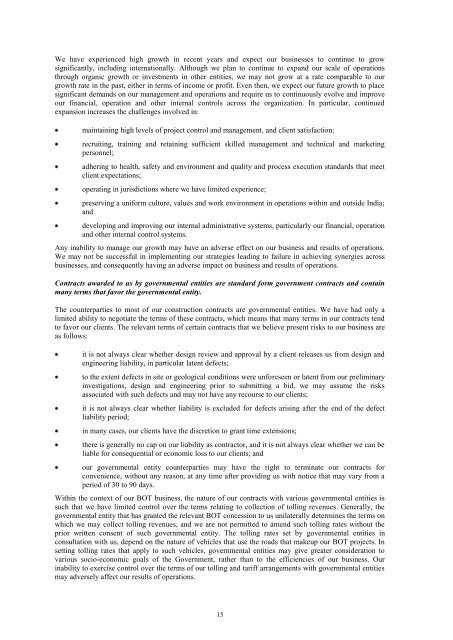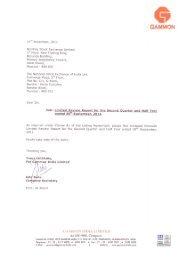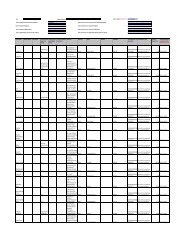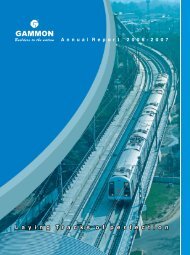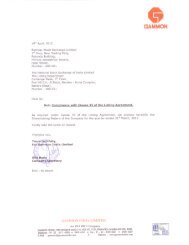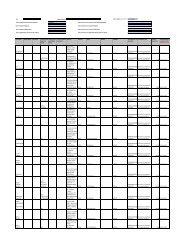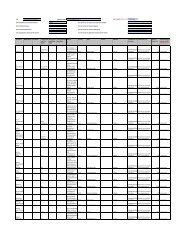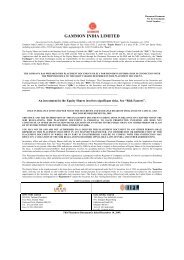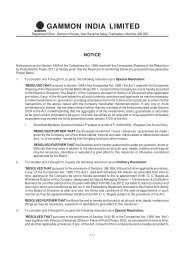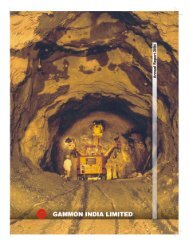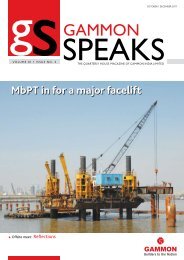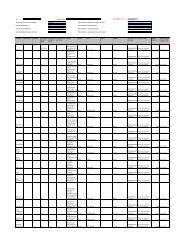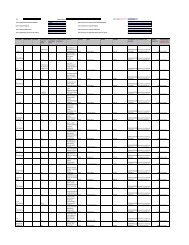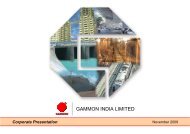GAMMON INDIA LIMITED
GAMMON INDIA LIMITED
GAMMON INDIA LIMITED
You also want an ePaper? Increase the reach of your titles
YUMPU automatically turns print PDFs into web optimized ePapers that Google loves.
We have experienced high growth in recent years and expect our businesses to continue to grow<br />
significantly, including internationally. Although we plan to continue to expand our scale of operations<br />
through organic growth or investments in other entities, we may not grow at a rate comparable to our<br />
growth rate in the past, either in terms of income or profit. Even then, we expect our future growth to place<br />
significant demands on our management and operations and require us to continuously evolve and improve<br />
our financial, operation and other internal controls across the organization. In particular, continued<br />
expansion increases the challenges involved in:<br />
maintaining high levels of project control and management, and client satisfaction;<br />
recruiting, training and retaining sufficient skilled management and technical and marketing<br />
personnel;<br />
adhering to health, safety and environment and quality and process execution standards that meet<br />
client expectations;<br />
operating in jurisdictions where we have limited experience;<br />
preserving a uniform culture, values and work environment in operations within and outside India;<br />
and<br />
developing and improving our internal administrative systems, particularly our financial, operation<br />
and other internal control systems.<br />
Any inability to manage our growth may have an adverse effect on our business and results of operations.<br />
We may not be successful in implementing our strategies leading to failure in achieving synergies across<br />
businesses, and consequently having an adverse impact on business and results of operations.<br />
Contracts awarded to us by governmental entities are standard form government contracts and contain<br />
many terms that favor the governmental entity.<br />
The counterparties to most of our construction contracts are governmental entities. We have had only a<br />
limited ability to negotiate the terms of these contracts, which means that many terms in our contracts tend<br />
to favor our clients. The relevant terms of certain contracts that we believe present risks to our business are<br />
as follows:<br />
it is not always clear whether design review and approval by a client releases us from design and<br />
engineering liability, in particular latent defects;<br />
to the extent defects in site or geological conditions were unforeseen or latent from our preliminary<br />
investigations, design and engineering prior to submitting a bid, we may assume the risks<br />
associated with such defects and may not have any recourse to our clients;<br />
it is not always clear whether liability is excluded for defects arising after the end of the defect<br />
liability period;<br />
in many cases, our clients have the discretion to grant time extensions;<br />
there is generally no cap on our liability as contractor, and it is not always clear whether we can be<br />
liable for consequential or economic loss to our clients; and<br />
our governmental entity counterparties may have the right to terminate our contracts for<br />
convenience, without any reason, at any time after providing us with notice that may vary from a<br />
period of 30 to 90 days.<br />
Within the context of our BOT business, the nature of our contracts with various governmental entities is<br />
such that we have limited control over the terms relating to collection of tolling revenues. Generally, the<br />
governmental entity that has granted the relevant BOT concession to us unilaterally determines the terms on<br />
which we may collect tolling revenues, and we are not permitted to amend such tolling rates without the<br />
prior written consent of such governmental entity. The tolling rates set by governmental entities in<br />
consultation with us, depend on the nature of vehicles that use the roads that makeup our BOT projects. In<br />
setting tolling rates that apply to such vehicles, governmental entities may give greater consideration to<br />
various socio-economic goals of the Government, rather than to the efficiencies of our business. Our<br />
inability to exercise control over the terms of our tolling and tariff arrangements with governmental entities<br />
may adversely affect our results of operations.<br />
15


